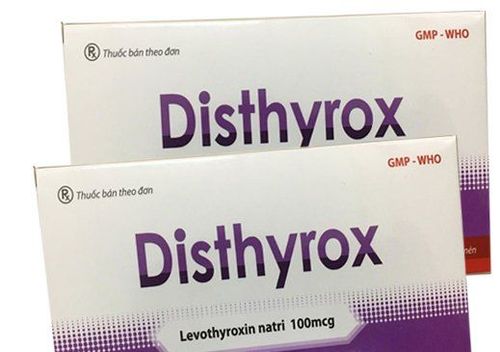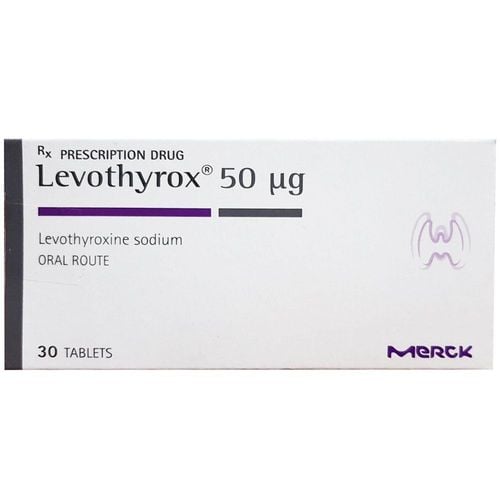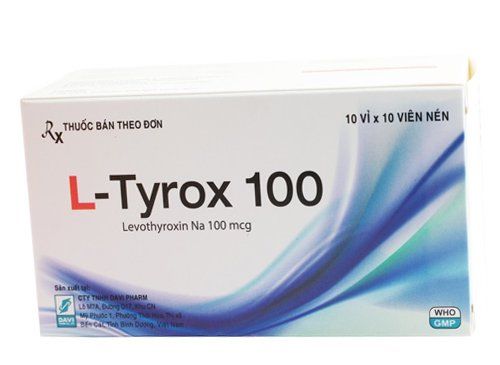This is an automatically translated article.
Vinathyrox medicine 100mcg is a product of Ba Dinh Biopharmaceutical Joint Stock Company with the main ingredient being Levothyroxine, an isomer of thyroid hormone. The drug is prepared in the form of tablets, box of 2 blisters x 14 tablets. Levothyroxine is indicated for the replacement or adjunctive treatment of hypothyroidism syndrome or other conditions of the thyroid gland.
1. Uses of the drug Vinathyrox 100mcg
Vinathyrox 100mcg has the main ingredients including:
Levothyroxine sodium: 100mcg; Excipients: Sodium starch glycolate, Sodium bicarbonate, Avicel, Magnesium stearate, Povidon K30, Corn starch just enough for 01 tablet. Levothyroxine is an isomer of thyroxine, one of the two major thyroid hormones. Levothyroxine preparations are on the market today in synthetic form. The thyroid gland is an exocrine gland with the role of secreting hormones that regulate the body's activities, the two main thyroid hormones are thyroxine (T4) and triiodothyronin (T3). It is this amount of T3 and T4 released from the thyroid gland that will perform its regulatory function by entering the general circulation to go to many different organs. T3 and T4 secretion is regulated by the anterior pituitary hormone thyrotropin (TSH). But conversely, TSH secretion is regulated by levels of free T4 and T3 and thyrotropin-releasing factor (TRH) in the hypothalamus. Understanding the hypothalamic-pituitary-thyroid system and its down-regulation is paramount for the diagnosis and treatment of thyroid dysfunction.
The effect of thyroid hormones is to speed up the metabolism, regulate the growth and differentiation of the body's cells. Therefore, noticeable symptoms in children who lack this hormone will slow down; The skeletal system and many other parts of the body are slow to mature, slow to ossify the bones, and slow to develop the brain. Most of the effects of thyroid hormone are expressed through triiodothyronin T3, while the majority of triiodothyronin is derived from deiodination of thyroxine T4 in peripheral tissues.
Thyroid hormone increases basal metabolic rate, metabolizing important body substances such as sugars, lipids, proteins and increases oxygen consumption in most tissues. Thus, thyroid hormone exerts powerful effects on all organs, directly on tissues, and is especially important in central nervous system development.
2. Indications and contraindications of the drug Vinathyrox 100mcg
Vinathyrox 100mcg is a prescription drug prescribed by a doctor, used to treat the following cases:
Hypothyroidism due to any cause and age, including in pregnant women to replace or supplement thyroid hormone, except in cases of subacute thyroiditis with temporary hypothyroidism in the recovery stage. Simple goiter, chronic thyroiditis (Hashimoto): Drugs that inhibit thyrotropin secretion (TSH) reduce goiter size. Thyrotoxicosis: Used in combination therapy with antithyroid drugs to prevent goiter growth and hypothyroidism. The drug Vinathyrox 100 mcg should not be used in the following cases:
People with hypersensitivity to Levothyroxine or any ingredient of the drug; Untreated thyrotoxicosis; Acute myocardial infarction ; Untreated adrenal insufficiency
3. Dosage and how to use Vinathyrox medicine 100mcg
Usage: Vinathyrox 100mcg drug is used orally. Patients should take the entire Vinathyrox 100mcg tablet, do not chew, break, or crush it because it can reduce the effectiveness of the drug. The drug should be taken in the morning, on an empty stomach or at least 2 hours before breakfast.
For children, before each use, soak the tablet in water until it becomes a smooth suspension. Have the child drink the suspension and add some water.
Dosage:
Mild hypothyroidism in adults:
Starting dose: 50mcg/day, once a day. Increase dose from 25-50mcg/day over the next 2-4 weeks until desired effect is achieved. In patients with cardiovascular disease, the starting dose is 25 mcg/day, once a day or 50 mcg/day, taken every other day. Next, titrate up the dose by 25mcg every 4 weeks. In patients without cardiac disease, the dose can be increased rapidly to achieve a maintenance dose of 100-200 mcg/day. Severe hypothyroidism in adults:
Initial dose: 12.5 - 25mcg/time, once a day. Increase the dose by 25 mcg/day over the next 2-4 weeks until the desired effect is achieved. Maintenance dose: 75 - 125 mcg / time, 1 time a day. Hypothyroidism in the elderly:
Starting dose: 12.5 - 25mcg / time, 1 time a day. Increase dose gradually over 3 to 4 weeks until desired effect is achieved. Maintenance dose: 100-200 mcg/day, can be increased if needed, depending on the individual patient. Hypothyroidism in children:
Under 1 year old: 25-50mcg/time, once a day. From 1 year: 3-5 mcg/kg/day. Increase dose to approximately 150 mcg/day, achieved during early or mid-teens. Higher doses may be maintained if needed in some children. The dose can also be calculated based on the child's weight as follows:
0 - 6 months: either 8 - 10 mcg/kg/day or 25 - 50 mcg/day; From 6 to 12 months: 6 - 8mcg/kg/day or 50 - 75mcg/day; From 1 to 5 years old: 5 - 6mcg/kg/day or 75-100mcg/day; From 6 to 12 years old: 4 - 5mcg/kg/day or 100 - 150mcg/day; 12 years and older: 2 – 3 mcg/kg/day or more than 150 mcg. Congenital hypothyroidism (cretinism) in neonates:
Healthy, full-term infants: 37.5 mcg/time/day or 25 - 50 mcg Premature babies, babies under 2kg or at risk of heart failure: Initial dose 25mcg/day initially, increased to 50mcg/day over the next 4-6 weeks.
4. How to handle an overdose of Vinathyrox 100mcg
Symptoms of overdose: Causes increased metabolism similar to symptoms of endogenous thyroid hormone toxicity such as palpitations, restlessness, sweating, increased blood pressure, increased heart rate, increased appetite, diarrhea, fear of heat , abdominal cramps, arrhythmias, tremors, insomnia, fever, menstrual disorders. Symptoms may appear immediately or after many days after taking the drug.
Treatment:
Reduce dose or temporarily stop Levothyroxine, take the patient to the hospital for symptomatic treatment and support necessary means. The first thing to do is to reduce the absorption of the drug taken from the gastrointestinal tract and limit the effects on the central and peripheral nervous system. Immediately gastric lavage or induce vomiting if not contraindicated, cholestyramine or activated charcoal to reduce absorption of levothyroxine. Give oxygen, maintain ventilation if needed. Use beta-adrenergic blocking agents, cardiac glycosides if congestive heart failure occurs. Symptomatic treatment with fever reduction, hyperglycemia, rehydration when needed. Glucocorticoids can be used to inhibit the conversion of T4 to T3.
5. Side effects of the drug Vinathyrox 100mcg
Patients may experience some unwanted side effects while using Vinathyrox 100mcg such as:
Common: Irritability, diarrhea, weight loss, palpitations, nervousness, tremor, tachycardia , arrhythmia, abdominal cramps, sweating, angina pectoris, headache, insomnia, fear of heat, fever. Less frequent: Hair loss. Rare: Heart failure, increased metabolism, allergies, osteoporosis, pseudotumor in children, early craniosynostosis in neonates. If you experience any unusual symptoms while being treated with Vinathyrox 100 mcg, you should immediately notify your doctor or go to a medical facility for appropriate treatment.
6. Interactions of drugs Vinathyrox 100 mcg
Vinathyrox 100 mcg can interact if used concurrently with the following drugs and substances:
Corticosteroids: Change the clearance of corticosteroids. Corticosteroid dosage should be adjusted based on assessment of thyroid function and clinical status of the patient. Amiodarone: Causing hyperthyroidism or hypothyroidism should aggravate thyroid dysfunction in patients receiving levothyroxine therapy. Coumarin, Heparin or Indanodion derivatives anticoagulants: Influence on oral anticoagulant effect. Anticoagulation dose adjustment is based on prothrombin time and when the dose of thyroid hormone is increased, the anticoagulant dose should be reduced. Insulin or oral antidiabetic drugs: Increases the need for insulin or antidiabetic drugs. Beta-adrenergic blockers: affect the action of some drugs of this class. Cytokines such as Interferon, Interleukin: Causes both hypothyroidism and hyperthyroidism. Cardiac glycosides: Reduces the effect of the drug. Ketamine: Increases blood pressure, increases tachycardia or arrhythmia
7. Note when using Vinathyrox 100 mcg drug
Caution in patients with hypertension, cardiovascular disease. Patients with diabetes, diabetes insipidus, adrenal insufficiency may increase symptoms during the use of Vinathyrox 100 mcg; The prothrombin time should be checked regularly if the combination of oral anticoagulants is required to determine if a dose adjustment is needed. Glucocorticoid should be used in combination if treating myxedema coma. Caution should be exercised in people who drive and operate machinery because the drug can cause agitation, tachycardia, and insomnia. Vinathyrox 100mcg is thought to cross the placenta very little, so it can be given to pregnant women with hypothyroidism during pregnancy because the need for Levothyroxine may increase. Lactation: Small amounts of thyroid hormone may be excreted in breast milk, however, it is unlikely to have harmful effects on the infant. However, caution should be exercised when using the drug in women who are or plan to breastfeed. Above is all information about the use of Vinathyrox 100mcg drug, dosage and important notes when using. The patient only uses the drug when prescribed and assessed by the doctor. If you still have questions about how to use Vinathyrox 100mcg, you can consult your doctor or pharmacist.
Please dial HOTLINE for more information or register for an appointment HERE. Download MyVinmec app to make appointments faster and to manage your bookings easily.













